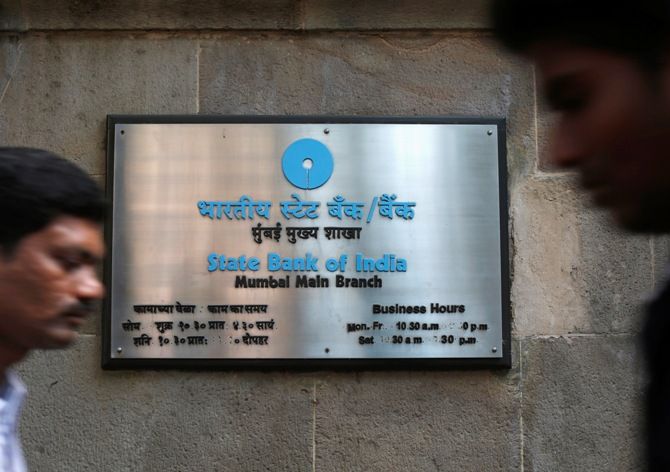The consolidated entity can target good growth FY18 onwards, analysts say.

Shares of all three listed associate banks of State Bank India (SBI) gained up to five per cent each in intra-day deals on Thursday, a day after the Cabinet approved the merger of five associate banks -- State Bank of Bikaner and Jaipur, State Bank of Hyderabad, State Bank of Mysore, State Bank of Patiala and State Bank of Travancore -- with State Bank of India.
SBI, on the other hand, that gained nearly two per cent to hit a high of Rs 277 on the National Stock Exchange in intra-day deals, trimmed gains to end 0.5 per cent up at Rs 270 levels.
The three listed associate banks, too, pared some gains and ended 3.9 per cent higher.
By contrast, the Nifty50 closed 0.6 per cent higher at 8,778 levels.
Analysts say that the merger with the associate banks has been one of the long-pending agendas.
Branch rationalisation, if executed well, would be one of the key synergy benefits. Cost savings on account of treasury operations, audit, technology, and others would also lower the cost-to-income ratio in the long term, analysts say.
However, all this will take time to bear fruit, they caution.
“The good part is that the share-swap ratio has also been announced. The management has been preparing themselves for the integration. On those lines, they had already ensured that the balance sheets of the subsidiaries are cleaned up.
“This was evident in the recently concluded quarter, in which the listed subsidiaries reported a steep increase in their non-performing assets (NPAs). Hence, the integration-related aspect purely on asset quality is not going to make SBI’s balance sheet shaky,” says Aalok Shah, an analyst tracking the banking sector at Centrum.
That apart, the banks will not have to compete with one another for loan growth or market share. After the merger, the overall asset quality of SBI will also not deteriorate much, given its stringent provisioning norms. As a result, the consolidated entity can target good growth FY18 onwards, analysts say.
Given the run-up in the stocks of associate banks, experts advise against making a fresh investment at the current levels, but suggest investors stay put at least till the merger/record date with SBI is announced.
“There could still be a price arbitrage as the merger date has not been made clear yet. Stocks of SBI’s listed subsidiaries will remain in action in anticipation of a higher price till the merger/record date is announced,” Shah said.
As regards SBI, margin resilience and lowering slippages’ rate and resolutions, will be key factors.
Analysts at Antique say that SBI is best-positioned to capitalise on growth opportunities owing to its strong capital base and project net non-performing loans (NPLs) to decline to 2.9 per cent by FY19 (estimated). It is 4.24 per cent currently.
“SBI has gained market share in both advances/deposits portfolio, is actively working to mitigate risk in the agri/SME portfolio and is also consistently improving the rating profile of its corporate exposure. We expect earnings to gain strong traction (27 per cent compound annual growth over FY17-19) aided by controlled credit cost/opex and pick-up in loan growth.
“SBI is our top investment idea amongst PSU banks though risk-reward has moderated following the recent up move in the stock,” says Nitin Aggarwal, an analyst tracking the stock with Antique.
R Sreesankar, co-head for institutional equities at Prabhudas Lilladher, also maintains a ‘buy’ rating on SBI with a price target of Rs 335 (earlier target price of Rs 307).
“The clean-up exercise, and integration with associate banks is unlikely to deter key ratios for SBI. We draw comfort from the bank’s healthy pre-provisioning profits and capital position. We retain a buy rating on SBI, with a target price of Rs 310," Shah added.










 © 2025
© 2025